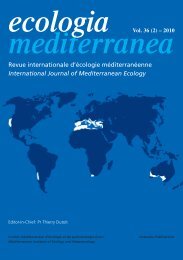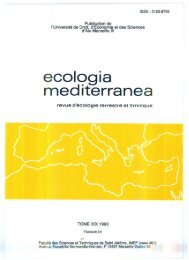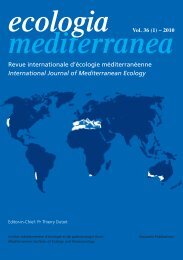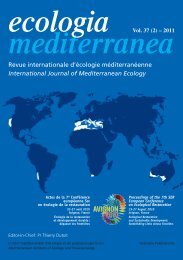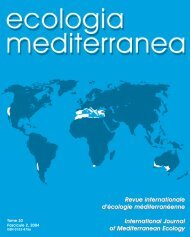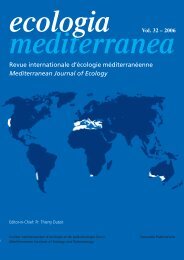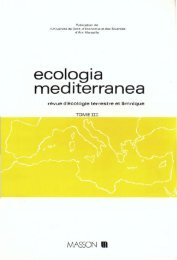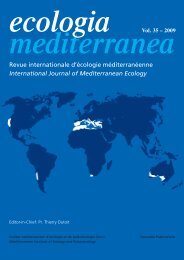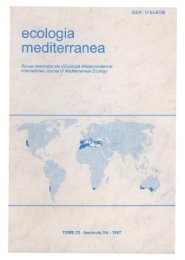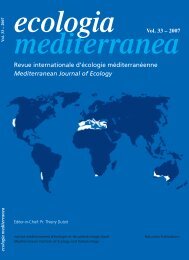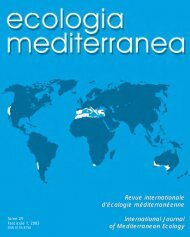Revue internationale d'écologie méditerranéenne International ...
Revue internationale d'écologie méditerranéenne International ...
Revue internationale d'écologie méditerranéenne International ...
Create successful ePaper yourself
Turn your PDF publications into a flip-book with our unique Google optimized e-Paper software.
260<br />
◆ FAITS DE CONSERVATION EN MÉDITERRANÉE / MEDITERRANEAN CONSERVATION NEWS<br />
one each day. Amazingly, lactating females could fly long distances<br />
– in some cases over a kilometre – carrying their young<br />
(whose weight would have constituted a considerable percentage<br />
of the mother’s!) to the new site. The function of roost-switch<br />
behaviour, occurring in many bat species which roost in trees<br />
or rock crevices, is unclear. This behaviour may be valuable to<br />
avoid predation, search for a more favourable microclimate,<br />
disrupt parasite cycles or respond to social needs. Undoubtedly,<br />
by travelling between alternate trees the bats update knowledge<br />
of roost locations, so that they are prepared to head immediately<br />
for another tree should they need to leave the roost because of<br />
an approaching predator, sudden damage to roost structure etc.<br />
In such circumstances, moving without hesitation to a better site<br />
may make the difference between life and death.<br />
Our study shows that barbastelle protection requires the preservation<br />
of large areas of untouched woodland. Dead trees, often<br />
removed by traditional forestry practices in Italy and elsewhere<br />
because erroneously deemed harmful to woodland, should be<br />
retained. Barbastelles need large numbers of dead trees since<br />
these bats frequently switch roost and form small summer<br />
colonies (averaging a dozen individuals) scattered over large<br />
woodland areas. Old living trees must be preserved too as they<br />
will replace the dead ones which are continuously destroyed by<br />
mechanical and biological agents. Today, mature woodlands are<br />
progressively rarer in Italy, as in much of Europe, and intensive<br />
forest management gives barbastelles few chances to survive.<br />
It is hoped that international and national protection policies,<br />
such as the “Agreement on the Conservation of Populations of<br />
European Bats” recently ratified by Italy and aiming to encourage<br />
bat conservation in Europe, will help invert the trend and<br />
ensure survival of old forests, home to barbastelles as well as to an<br />
astonishing number of other fascinating, fragile and often poorly<br />
known creatures.<br />
For more information, read :<br />
— RUSSO, D., CISTRONE, L., JONES, G. AND MAZZOLENI, S., 2004.<br />
ROOST SELECTION BY BARBASTELLE BATS (Barbastella barbastellus,<br />
Chiroptera: Vespertilionidae) in beech woodlands of central Italy:<br />
consequences for conservation. Biological Conservation, 117: 73-81.<br />
Danil o Russo<br />
Laboratorio di Ecologia Applicata, Dipartimento AR.BO.PA.VE., Università<br />
degli Studi di Napoli Federico II, Via Università 100, I-80055 Portici<br />
(Napoli), Italy, Email: danrusso@unina.it<br />
& School of Biological Sciences, University of Bristol,<br />
Woodland Rd, BS8 1UG, Bristol, UK<br />
ecologia mediterranea, tome 29, fascicule 2, 2003



